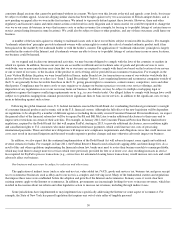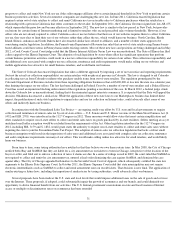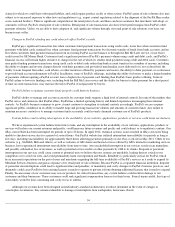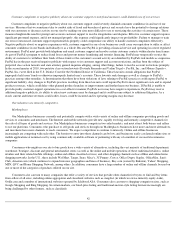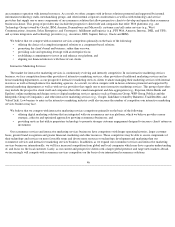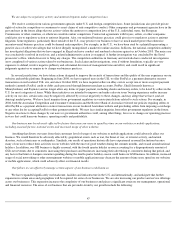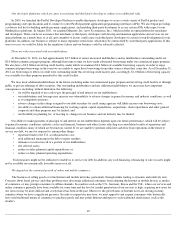eBay 2012 Annual Report Download - page 42
Download and view the complete annual report
Please find page 42 of the 2012 eBay annual report below. You can navigate through the pages in the report by either clicking on the pages listed below, or by using the keyword search tool below to find specific information within the annual report.
February 2011, the trial court granted plaintiffs' motion for summary judgment, concluding that immunity under the Communications Decency
Act did not apply. The trial court further held that StubHub violated the North Carolina unfair and deceptive trade practices statute as it pertained
to the two named plaintiffs, and certified its decision for immediate appeal to the North Carolina Court of Appeals. In February 2012, the North
Carolina Court of Appeals overturned the lower court's decision. The Court of Appeals decision is now final. Similar actions are pending in other
states. Laws and regulations governing the resale of event tickets outside the U.S. (for example, in Europe) may be more restrictive, and carry
harsher penalties and fines, than corresponding U.S. laws and regulations. In 2012, France passed a law prohibiting the habitual resale of event
tickets without permission from the event organizer. In addition, the unauthorized resale of football (soccer) tickets is illegal in the U.K., where a
StubHub site was launched in 2011.
Some event organizers and professional sports teams have expressed concern about the resale of their event tickets on our sites. Suits
alleging a variety of causes of actions have in the past, and may in the future, be filed against StubHub and eBay by venue owners, competitors,
ticket buyers and unsuccessful ticket buyers. Such litigation could result in damage awards, could require us to change our business practices in
ways that may be harmful to our business, or could otherwise negatively affect our tickets business.
Our tickets business is subject to seasonal fluctuations and the general economic and business conditions that impact the sporting events
and live entertainment industries. The economic downturn resulted in a decrease in ticket prices sold on our sites and negatively impacted
revenue and profits. In addition, a work stoppage, strike or lockout by a professional sports league (for example, the National Hockey League
lockout that ended in January 2013) that results in the cancellation of all or a portion of the games in a league's season would harm our tickets
business. In addition, a portion of the tickets inventory sold by sellers on the StubHub website is processed by StubHub in digital form. Systems
failures, security breaches, theft or other disruptions that result in the loss of such sellers' tickets inventory could materially harm our tickets
business.
Our tickets business also faces significant competition from a number of sources, including ticketing service companies (such as Live
Nation Entertainment/Ticketmaster, Comcast
-Spectacor and Tickets.com), event organizers (such as professional sports teams and leagues),
ticket brokers and online and offline ticket resellers, such as TicketsNow (which is owned by Live Nation Entertainment) and RazorGator. In
addition, some ticketing service companies and event organizers have begun to issue event tickets through various forms of electronic ticketing
systems that are designed to restrict or prohibit the transferability (and by extension, the resale) of such event tickets. Ticketing service
companies have also begun to use market-based pricing strategies or dynamic pricing to charge much higher prices than they historically have
for premium tickets. Besides charging higher prices, these ticketing service companies have also imposed additional restrictions on
transferability for these types of tickets, such as requiring customers to pick up these tickets at will-call with the purchasing credit card. To the
extent that event tickets issued in this manner cannot be resold on our websites, or to the extent that we are otherwise unable to effectively
compete with these competitors, our tickets business would be harmed. Pursuant to commercial arrangements with certain of its partners,
StubHub provides some of its sellers with the ability to conduct integrated resale transactions, which consumers may prefer due to, among other
factors, quicker delivery and lower fraud concerns. These integrations are largely deal-dependent, and these arrangements may not be renewed
on favorable terms, or at all.
Our StubHub business receives funds directly from buyers for tickets purchased from sellers, and subsequently pays the sellers upon
shipment of the tickets. Intermediation of transactions between buyers and sellers could potentially subject StubHub to licensure requirements,
laws and regulatory oversight in certain jurisdictions, which may harm our ticket business.
We depend on key personnel.
Our future performance depends substantially on the continued services of our senior management and other key personnel and our ability
to retain and motivate them. We do not have long-term employment agreements with any of our key personnel and do not maintain any “key
person” life insurance policies, and some members of our senior management team have fully vested the vast majority of their in-the-money
equity incentives. The loss of the services of any of our executive officers or other key employees could harm our business.
Our businesses all depend on attracting and retaining key personnel. Our future success will depend on our ability to attract, train, retain
and motivate highly skilled technical, managerial, marketing and customer support personnel. Competition for these personnel is intense,
especially in the Silicon Valley where our corporate headquarters are located, and we may be unable to successfully attract, integrate, or retain
sufficiently qualified personnel. In making employment decisions, particularly in the Internet and high-technology industries, job candidates
often consider the value of the equity awards they would receive in connection with their employment. Fluctuations in our stock price may make
it more difficult to retain and motivate employees.
40


